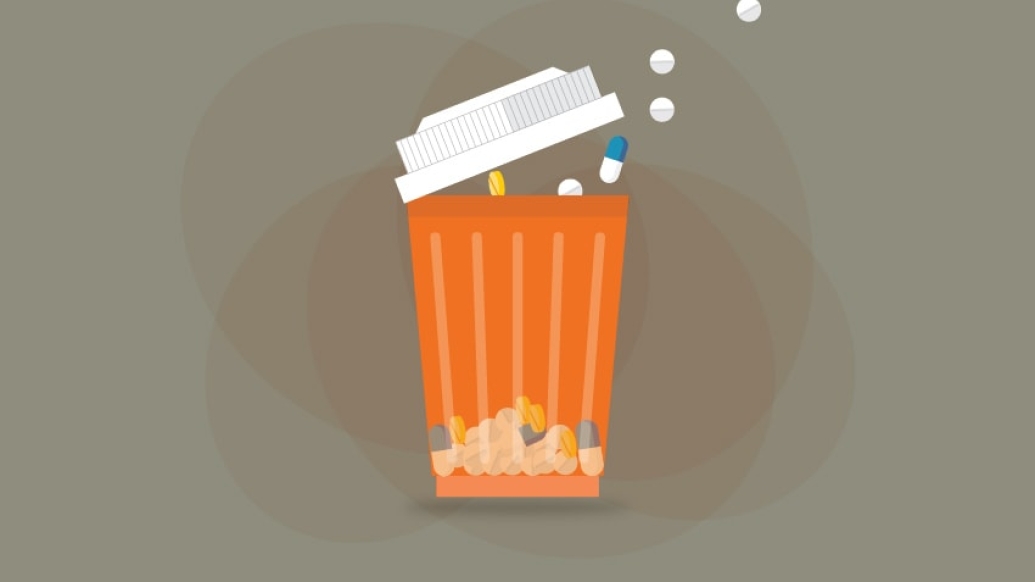A national event encouraging prescription drug disposal returns this weekend. A Michigan Medicine physician explains the benefits of cabinet cleanses and safe storage.
7:00 AM
Author |

Medications are a wonder of modern science. Although they can be invaluable in treating a wide variety of medical conditions and symptoms, they can also be harmful if misused, regardless of whether the circumstances are intentional or accidental.
MORE FROM MICHIGAN: Sign up for our weekly newsletter
Children are often the victims of accidental misuse. The Centers for Disease Control and Prevention estimates more than 70,000 children under the age of 18 visit emergency departments in this country each year because of accidental ingestion of medications.
This is more than a childhood problem. Every year, more than 50,000 Americans die as a result of overdose of prescription medications and over one million emergency department visits occur annually in the United States as result of prescription drug overdose or misuse.
As an emergency physician, I have seen too many of these tragedies.
You can do something to help stem the tide of rising overdoses by controlling one of the most common sources of abused medications: the home medicine cabinet.
A survey conducted in 2010-2011 showed that 70.8 percent of those reporting abuse of prescription painkillers describe a similar source: a friend or relative via medications already in the medicine cabinet.
Removing these medications from the home can remove the temptation and risk for disaster.
Michigan is not immune from the increase in prescription deaths. Between 1999 and 2016, the total number of overdose deaths involving prescription opioids, as well as drugs like heroin and fentanyl, increased more than 17-fold — from 99 to 1,699. Physicians in Michigan are working together and with other health care professionals, policymakers and law enforcement members to alleviate this problem.
To help, clean out your medicine cabinet this week.
The 16th National Prescription Drug Take Back Day is on Saturday, April 27. These events, usually twice per year, provide an opportunity to remove — and safely dispose of — expired, unneeded or unwanted medications. By removing these drugs from the home, you eliminate the potential for them to be misused.
Here are some additional reasons why it is improve to make your home medicine cabinet, and overall home, safer:
-
Many teens and young adults who report abuse of prescription medicines say they first obtained medicines from a family or friend's medicine cabinet. Check your medicine cabinets and anywhere else you may be keeping medications. Properly discard any expired or unneeded medications in your possession.
-
Expired medications pose a risk of interaction with other prescription drugs. Although many safeguards exist with modern computerized recordkeeping to double-check for interactions with each other in a patient, sharing medications with someone else or retaining them for years to take with new medications is never a good idea.
-
Flushing medications down the toilet can damage the water supply — and, in some cases, may even be illegal.
-
Over-the-counter medications can also be a problem. Aspirin, acetaminophen or even iron supplements can be deadly if taken in large amounts.
-
Many pill organizers are not childproof. That can result in children ingesting medications that aren't safely stored. Keep all such organizers properly secured, whether or not they lock.
-
Medications should not be left unsecured and visible, such as near or on the kitchen table, where they may be accidentally ingested, or on a windowsill or in a vehicle, where they may be at risk of theft. Keep all medications out of sight and out of a child's reach.
Check your medicine cabinets, drawers, desks, purses, briefcases, cars and anywhere else you may be keeping medications and properly discard any expired medications or unneeded medications in your possession. This important step can help keep your home safe from a prescription drug overdose.
This article was originally published on April 27, 2017, and was updated on April 25, 2019.

Explore a variety of health care news & stories by visiting the Health Lab home page for more articles.

Department of Communication at Michigan Medicine
Want top health & research news weekly? Sign up for Health Lab’s newsletters today!





